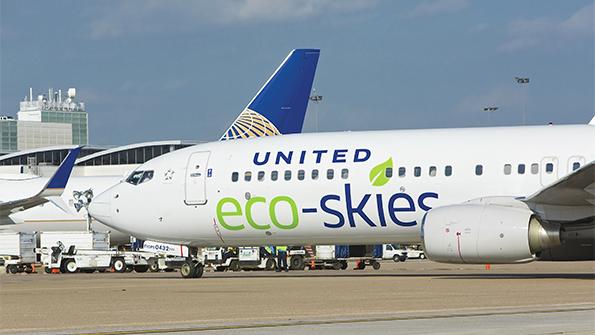
It has taken far too long, but the political will to greatly increase the availability, affordability and use of sustainable aviation fuels (SAF) is ramping up with almost dazzling speed and action.
People in lockdown worldwide have had time to reflect more deeply on humankind’s impact on Earth, while also becoming newly aware of mankind’s vulnerabilities. And having seen a world where air travel was all but suspended, more are also questioning whether this industry’s emission-reduction targets are sufficient. For many governments and individuals, a return to normal air traffic levels must be contingent on more stringent carbon emitting rules.
The same governments and individuals, however, tend to wag a finger at airlines, neither crediting their achievements in sustainability nor taking up offset programs offered to passengers. In effect, they have left it to the airlines to find a remedy for which, technologically, there is none in the short- to medium-term, except for a massive increase in SAF use. For that to be possible, governments and industries outside the aviation industry cannot be merely involved; they must be heavily invested.
That is the corner that seems to be turning in 2021.
In the US, President Joe Biden’s proposed infrastructure and climate plan, with its related tax plan, would remove the subsidies for fossil fuel producers and substantially expand tax incentives for clean energy. Specific to aviation, the plan includes a blender’s tax credit for SAF, enabling the decarbonization of a key portion of the US transportation sector.
There are other proposals in the plan that would directly benefit aviation, such as a request for $915 million for NASA research to broaden and accelerate the testing of technologies to enable ultra-efficient next-generation airliners. But in emissions’ reduction, aviation’s fastest route is via SAFs.
Perhaps not coincidentally, a major US carrier, United Airlines, has launched an alliance of global corporations that will collectively contribute toward the purchase of some 3.4 million gallons of SAF this year. The most remarkable part of the United Eco-Skies Alliance Program is the depth and breadth of its initial partner list, which spans major brand names like DHL, HP and Nike, along with consultancies, software engineers and a pharmaceutical company. Together, their power to garner political support for SAF production while also enhancing their sustainability credentials with customers and shareholders will be far greater.
The US is far from alone in its heightened understanding of the importance of SAFs for an even more sustainable air transport industry, and some would say it’s late to the table. But the sheer size and historic significance of the US market will likely spur more initiatives.
Within days of United’s announcement, a new SAF-promoting organization was launched. The Council on Sustainable Aviation Fuels Accountability (CoSAFA) comprises multiple organizations, including A4A and IATA. Its goal is to accelerate aviation decarbonization and increase the adoption of SAF.
Aviation’s green plod is turning into a full-on charge.
